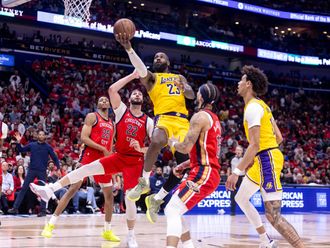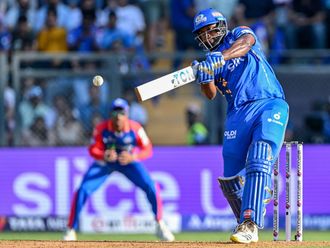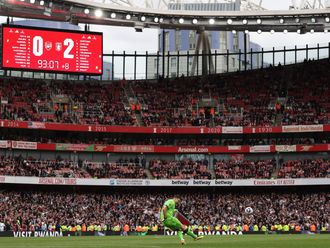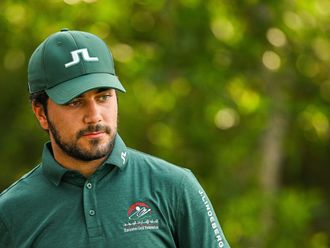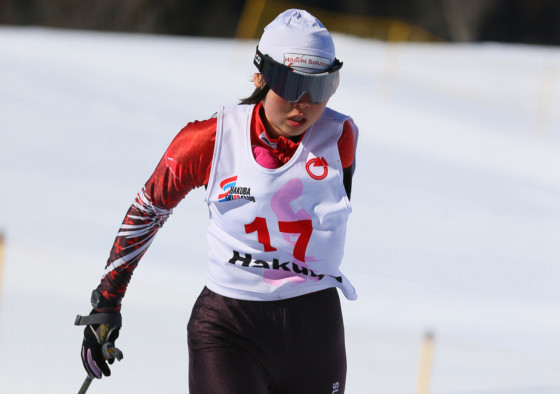
Tokyo: Born with a paralysed arm and left homeless by Japan’s 2011 tsunami, schoolgirl skier Yurika Abe has overcome severe hardships to compete at the Sochi Paralympics — and she carries the hopes of her fellow disaster victims with her.
The 18-year-old’s move to the big stage comes just three winters after she took up cross-country skiing, clutching a single pole in her right hand.
She skied six kilometres and fired off 10 rifle shots to finish 13th in the woman’s short standing biathlon on Saturday in her Paralympic debut on Russia’s Black Sea coast.
On Tuesday, three years to the day after monster waves ravaged Japan’s northeast coast, Abe will tune up on the eve of another battle — the third of six cross-country and biathlon races she has determinedly signed up for in Sochi.
“I will try to ski in a way that gives energy to people back home as I feel them cheering me on,” Abe told a send-off rally before leaving her home prefecture of Iwate in early February.
Her high school headmaster Hiroshi Kikuchi praised his student, saying he hoped she could “show we have not been defeated by the disaster”.
Abe hails from the fishing town of Yamada, which lost more than 800 residents and several thousand homes, including her own, in the 2011 disaster.
On March 11 that year, a massive 9.0-magnitude undersea earthquake unleashed a towering tsunami that smashed into the Japanese coast.
More than 18,000 people were killed, and damage caused to the Fukushima nuclear plant sparked the worst atomic accident in a generation.
Abe’s efforts are the latest example of the immense role sport has played in the healing process for the region, as top Japanese athletes both encouraged victims and took inspiration from their struggle.
At the Sochi Olympics, Japan’s 19-year-old sensation Yuzuru Hanyu, who hails from the tsunami-hit city of Sendai, won the men’s figure skating gold medal — Japan’s only title of the Games, which also made him the first Japanese man to win an Olympic figure skating gold and the youngest Olympic men’s champion in 66 years.
Abe is the only disaster victim among Japan’s 20 Paralympians in Sochi, and her ambitions are modest — for now.
“I’m aiming to finish in the top eight,” she has told Japanese media.
“I want to aim much, much higher later on and would like to go to the Paralympics four years from now and again in eight years.”
Despite suffering permanent nerve damage in her left arm during birth, Abe was able to take up volleyball and played on her junior high school team.
When she saw television coverage of the 2010 Vancouver Paralympics, she was awed by cross-country skiers who were able to compete with the use of just one arm.
“I can do it too,” she thought to herself, and contacted the head of Japan’s national Paralympic ski team, Hideki Arai.
Her leg muscles steeled by years on the volleyball court, Abe was invited to take part in Arai’s training camp just a few months before the disaster, which struck Japan on her last day of junior high school.
While she and six of the family members she lived with survived — including elderly grandparents — they lost their home, situated just one kilometre from the Pacific shoreline. Three years on, they still live in housing units hastily constructed for tsunami refugees.
Abe herself left the family to attend a high school known for cultivating competitive skiers in the city of Morioka, about 70 kilometres inland.
She trains with able-bodied athletes and belongs to a private skiing team, coached by Arai, which is renowned for its disabled competitors.
Abe sealed her path to the Paralympics by finishing seventh in the 15-kilometre cross-country standing race at the world championships for the disabled last year.
The athlete, who is due to start university in Tokyo next month, has said that, if not for the disaster, she might have become a serious competitive skier much later in life.
“The tough experience of the disaster may be one reason why she never says die,” said team head Arai. “She gives it all she has, right to the end.”




